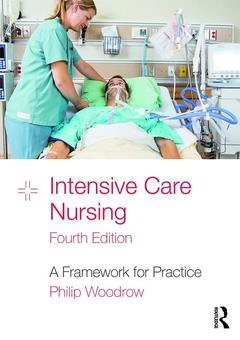Intensive Care Nursing (4th Ed.) A Framework for Practice
Auteur : Woodrow Philip

Especially written for qualified nurses working in intensive care units, this comprehensive text has been developed to be as accessible as possible. This fourth edition has been revised throughout to ensure the evidence base is completely up to date and the content reflects contemporary best practice.
Intensive Care Nursing is structured in user-friendly sections. The chapters contain sections outlining the "fundamental knowledge" needed to understand key chapters, "implications for practice" boxes, further reading and resources overviews, "time out" sections for revision and clinical scenarios with questions included. Reviewed throughout by experienced practitioners and teachers, it covers:
- patient-focused issues of bedside nursing;
- the technical knowledge necessary to care safely for ICU patients;
- the more common and specialised disease processes and treatments encountered;
- how nurses can use their knowledge and skills to develop their own and others' practice.
Written by a practice development nurse with a strong clinical background in intensive care nursing and experience of teaching nursing, Intensive Care Nursing is essential reading for nurses and health professionals working with seriously ill patients, particularly those undertaking post-registration training in the area.
Part 1: Contexts Of Care
1. Nursing Perspectives
2. Humanism
3. Psychological Care
Part 2: Fundamental
4. Artificial Ventilation
5. Airway Management
6. Sedation
7. Acute Pain Management
8. Thermoregulation
9. Nutrition and Bowel Care
10. Mouthcare
11. Eyecare
12. Tiessue Viability
13. Children in Adult ICUs
14. Older Patients in ICU
15. Infection Prevention and Control
16. Pandemic Planning
Part 3: Monitoring
17. Respiratory Monitoring
18. Gas Carriage
19. Blood Gas Interpretation
20. Haemodynamic Monitoring
21. Blood Results
22. ECGs and Dysrhythmias
23. Neurological Monitoring
Part 4: Micropathologies
24. Cellular Pathology
25. Immunity and Immunodeficiency
26. Haemostasis
Part 5: Respiratory
27. Acute Respiratory Distress Syndrome (ARDS)
28. Alternative Ventilation
Part 6: Cardiovascular
29. Acute Coronary Syndromes
30. Coronary Surgery and Interventions
31. Shock
32. Sepsis
33. Fluid Management
34. Inotropes and Vasopressors
35. Vascular Surgery
Part 7: Neurological
36. Central Nervous System Injury
37. Peripheral Neurological Pathologies
Part 8: Abdominal
38. Acute Kidney Injury
39. Haemofiltration
40. Gastrointestinal Bleeds
41. Liver Failure
42. Obstetric Admissions to ICU
43. Organ Donation
Part 9: Metabolic
44. Severe Acute Pancreatitis
45. Diabetic Crises
46. Self-poisoning
Part 10: Professional
47. Transferring Critically Ill Patients
48. Professional Perspectives
49. Managing the ICU
50. Costs of Intensive Care
Philip Woodrow is Practice Development Nurse in Critical Care at East Kent Hospitals University Foundation Trust, UK.
Date de parution : 10-2018
17.4x24.6 cm
Date de parution : 09-2018
17.4x24.6 cm
Thèmes d’Intensive Care Nursing :
Mots-clés :
ICU Patient; ICU Nurse; critical care nursing; ICU Admission; paramedics textbooks; ICU Discharge; ODPs textbooks; AKI; CC3N level 3; Renal Replacement Therapy; ICU texts; ICU Care; ECMO; Non-invasive Ventilation; Targeted Temperature Management; Enteral Nutrition; Ventilator Induced Lung Injury; Multi-organ Dysfunction Syndrome; Spinal Cord; ICU Management; Extravascular Lung Water; APRV; Acute Respiratory Distress Syndrome; Ard; Bedside Nurses; Continuous Renal Replacement Therapy; Tidal Volumes; Energy Sources; Therapeutic Hypothermia; Neuromuscular Blockade



